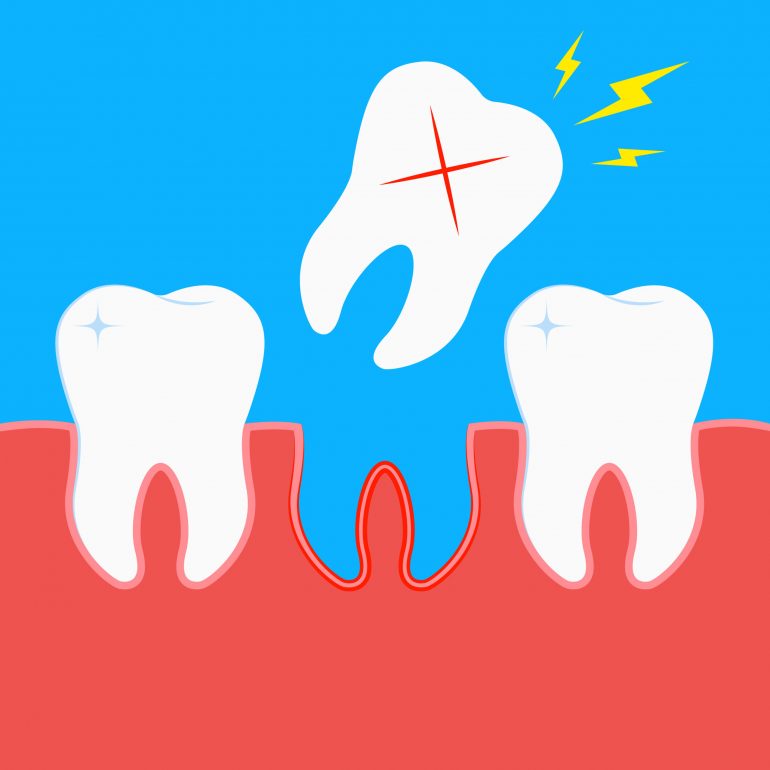How does tooth loss affect the risk of dementia?
Tooth loss plays an important role in the development of cognitive impairment and dementia. The risk of cognitive decline appears to increase with each tooth lost. How big is this risk and can timely dental treatment protect against occult cognitive decline?
A research group with the participation of researchers from New York University has now examined how tooth loss affects the risk of developing dementia and a general decline in cognitive abilities. The results of the analysis can be found in the English-language journal “The Journal of Post-Acute and Long-Term Care Medicine.”jamda) can be read.
The relationship between tooth loss and cognition
Experts report that, according to the Centers for Disease Control and Prevention in the United States, nearly one in six adults age 65 or older has already lost all of their teeth. Results from a previous study have also shown an association between tooth loss and decreased cognitive function, with several possible explanations for this relationship.
Why does tooth loss impair cognitive function?
Missing teeth make it difficult to chew, which can contribute to nutrient deficiencies or encourage changes in the brain. The team said a growing body of research is also pointing to a link between gum disease — a leading cause of tooth loss — and cognitive decline. Furthermore, tooth loss may reflect a lifelong socioeconomic disadvantage, which is also a risk factor for cognitive decline.
Alzheimer’s and dementia on the rise
“With the staggering number of people diagnosed with Alzheimer’s and dementia each year and the opportunity to improve oral health throughout life, it is important to gain a deeper understanding of the link between poor oral health and cognitive decline”, study author Prof. Insist with Dr. Wu from New York University.
The research group conducted a meta-analysis of longitudinal studies of tooth loss and cognitive impairment. For this purpose, 14 studies were evaluated, involving a total of 34,074 adults. Decreased cognitive function was found in 4,689 participants.
How much does tooth loss increase the risk of dementia?
The experts found in their investigation that adults with greater tooth loss had a 1.48-fold higher risk of developing cognitive impairment and a 1.28-fold higher risk of being diagnosed with dementia. This increased risk persisted even when other possible factors were taken into account.
Dentures protect against cognitive impairment
The team observed that adults with tooth loss had a higher risk of cognitive impairment when they did not have dentures (23.8 percent) than those with dentures (16.9%). As experts report, an additional analysis finally showed that if the participants had dentures, the association between tooth loss and cognitive impairment was not significant.
The researchers also conducted another analysis with a subset of eight studies. The aim was to determine whether there is a dose–response relationship between tooth loss and cognitive impairment. In other words, are a higher number of missing teeth associated with a higher risk of cognitive decline?
More lost teeth lead to higher risk
Indeed, the results confirmed such a link. Experts report that each additional missing tooth was associated with a 1.4 percent increased risk of cognitive impairment and a 1.1 percent increased risk of dementia.
Tooth loss may predict cognitive decline
Study author Jiang Qi of New York explains, “This dose-response relationship between the number of teeth lost and the risk of decreased cognitive function greatly strengthens the evidence linking tooth loss to cognitive impairment and provides some evidence that the teeth may be lost.” that tooth loss may predict cognitive decline.” university in one Press release.
“Our results underscore its role in maintaining good oral health and maintaining cognitive function,” said study author Professor Dr. Woo added. (as)
Author and source information
This text complies with the requirements of specialist medical literature, medical guidelines and current studies and has been checked by medical professionals.
hilarious:
- Jiang Qi, Zheng Zhu, Brenda L. Plasman, Bei Wu: Dose-response meta-analysis on tooth loss with risk of cognitive impairment and dementia in The Journal of Post-Acute and Long-Term Care Medicine (veröffentlich 08.07.2021). ), jamda
- New York University: Increased cognitive impairment, loss of teeth associated with dementia (veröffentlich 08.07.2021), New York University
Important Articles:
This article is for general guidance only and is not to be used for self-diagnosis or self-treatment. He cannot take the place of visiting the doctor.

Web guru. Amateur thinker. Unapologetic problem solver. Zombie expert. Hipster-friendly travel geek. Social mediaholic.





